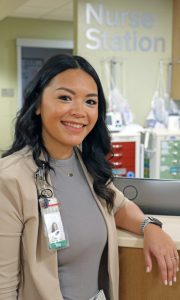
Kate Oleinik said she would not have been able to finish nursing school and ultimately become a registered nurse without the support of the WorkSmart Network. The Tomah Health registered nurse participated in the WorkSmart Network while working on her associate degree nursing (RN) program at Madison College-Reedsburg Campus. “WorkSmart was very beneficial to me,” said Oleinik. “I was in a place in my life where it was a lot of life changes, a lot of transitioning going on, and my commute was getting longer and the expenses were getting higher and WorkSmart was able to pay for mileage, helped pay for uniforms, my testing and tuition. It was really helpful for me and took a lot of stress off,” said Oleinik, who lives in New Lisbon.
Funded by the Workforce Innovation and Opportunity Act and facilitated through a partnership with the Workforce Development Board and Madison College, WorkSmart supports students obtain a licensure, certification, skilled trade or an associate degree and secure employment in high-demand occupations.
The WorkSmart Network has helped support a large percentage of graduates in each of the cohort groups at the Reedsburg Campus. “My first impression of WorkSmart was that you needed to be working to participate in the program. I found out that that’s not true because at the time I was a full-time student, I didn’t have a job,” explained Oleinik. “Had I known that this program existed at the start, I would have jumped the gun immediately, but I found out about it late in the game, but better late than never.”
Madison College employees say the WorkSmart Network and the commitment of college staff are valuable resources that help place more skilled employees in the local workforce. “At the Reedsburg Campus we help a lot of associate degree Nursing students graduate with less debt and more financial security,” said Madison College WorkSmart Advisor Greta Schaller-Alonso. “These students have a higher success and retention rate due to experiencing less financial strain, while having the support of an advisor to help triage college and community resources and assist with barriers they may be facing.”
At graduation, Schaller-Alonso said most students are already employed and most stay within the area. “We also benefit greatly from the support and partnership with our local hospitals and what they provide our students in clinical locations, scholarships, and employment opportunities,” she added.
Oleinik said she loves her work. “I would not take it back for anything and I love my job. I love the people here. It’s great,” Oleinik said of her position in the Acute Care Department at Tomah Health. “I like seeing the variety of patients, different conditions, every day is different. You never know what you’re going to get, which makes it interesting. It’s a very rewarding job seeing someone going home and feeling better and just knowing that you played a role in that I think is one of the one of the most rewarding parts.”
Oleinik said she plans to return to college this fall to obtain her Bachelor of Science in Nursing (BSN) degree. “Eventually, one day I would like to experience an ICU (Intensive Care Unit), possibly cardiology or pediatrics as they are a couple of my interests as of now.”